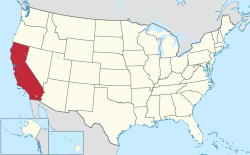| Gaming Commission overview | |
|---|---|
| Jurisdiction | State of California |
| Headquarters | 2399 Gateway Oaks Drive, Suite 220 Sacramento, CA 95833 |
| Website | California Commission website |
| Map | |
 | |
California Gambling Control Commission (CGCC) is the official gambling commission of the state of California. [1]
Contents
The Commission was proposed in the mid 1990s under the bills AB 2803 and AB 362 to "create a state agency to license card clubs and casinos operating within the state", based on Nevada's state gaming commission. [2]
As of May 2020, the California Gambling Control Commission has jurisdiction over 86 licensed non-tribal gambling establishments (cardrooms) in California. [3]
The Commission's primary responsibilities related to Tribal gaming include:
- Making suitability determinations for Tribal key employees, gaming resource suppliers (vendors), and financial sources;
- Serving as the administrator or trustee of specified funds, including distributing funds to eligible non-gaming Tribes; and
- Ensuring that the allocation of gaming devices or slot machines among the gaming tribes does not exceed the allowable number of gaming devices. [4]